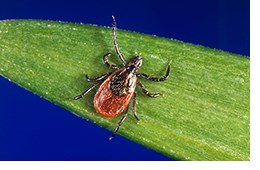One blacklegged tick that was found locally has tested positive for the bacteria that can cause Lyme disease.
This is the first positive tick reported in the Public Health Sudbury & Districts service area this year. The health unit used the positive test to remind the public of the importance of taking precautions to protect themselves and those in their care.
For example:
- Avoid walking in tall grass and make sure yards are kept clear of debris and overgrown vegetation, grass, bushes, and trees
- Keep wood piles and bird feeders away from homes
- Wear a long-sleeved, light-coloured shirt, pants, and closed-toe shoes
- Use insect repellents that are federally regulated and contain DEET, and follow the manufacturer’s instructions for their safe use
- Check your clothing, body, and pets for ticks and change your clothing upon returning home from the outdoors
- Take a shower to help wash off ticks that have not yet attached themselves to the skin
If you find a tick attached to a human:
- If a tick is found embedded in the skin, use tweezers to remove it as soon as possible.
- Use fine-tipped tweezers to grab the tick close to the skin and gently pull straight up.
- Wash the area with soap and water.
- Put the tick in a dry container and bring it to your local public health unit to be sent for identification and testing for Lyme disease.
- Follow-up with your health care provider to determine if you need treatment, especially if the tick has been attached for more than 24 hours.
One of the typical signs of Lyme disease is a rash that looks like a bull’s eye; the bite area is surrounded by a round, red rash.
Other symptoms of the disease can include fever, headache, and muscle and joint pain. If left untreated, Lyme disease can cause serious problems to the heart, joints, and nervous system. Lyme disease is treated with antibiotics.
For more information on Lyme disease and ticks, call Public Health Sudbury & Districts at 705-522-9200, ext. 464 (toll-free 1-866-522-9200) or visit www.phsd.ca.
